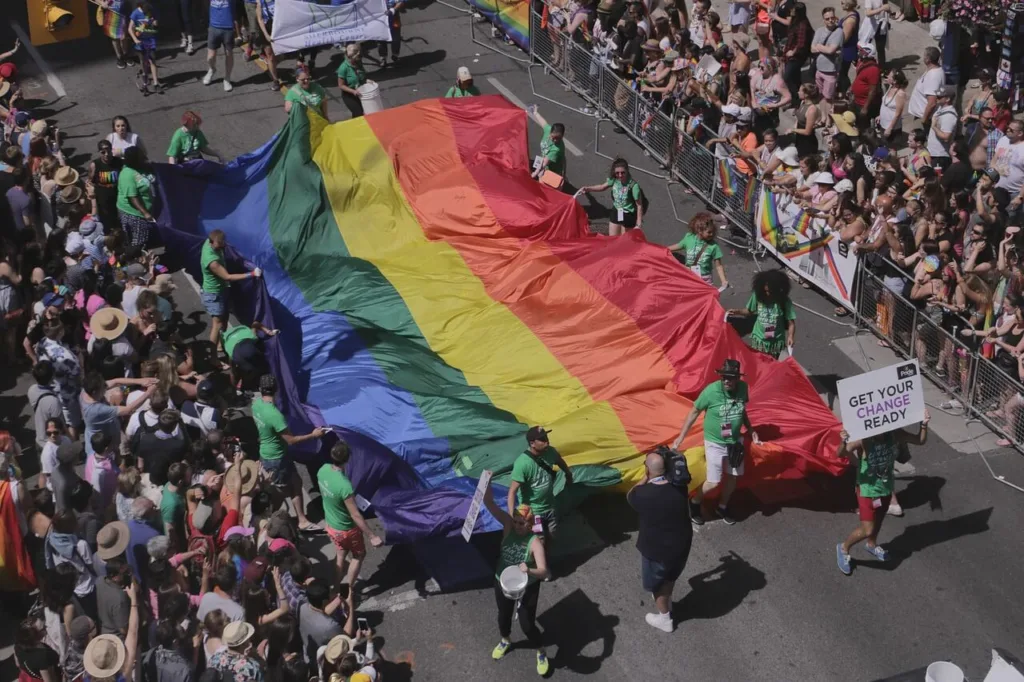Growing up as a gay man in rural Catholic Italy is a game of mixed signals. In the early 2000s, when I was a kid, representation of queer people in media was always along a certain stereotype, playing on campness for laughter: many will remember television personality Platinette (and her recent right-wing swerve). In a culture that never quite came to terms with its macho undertones, there was exactly one way to be gay, and that was bound to end up in mockery. Self-expression was a matter of being a macchietta (comedy act), nothing more than a character built to invoke hilarity. You can sleep with whoever you’d like, they would tell you, as long as you don’t behave like one of those gays (if you’re Italian, you can probably guess the slur that was usually substituted in place of ‘those gays’).
Sure enough, the rise of the Internet meant I could access more and more diverse representation, learning that being gay was not tied to a particular personality or behaviour. And yet, I kept coming back to those images I had learned as a kid, struggling to fight the fears that were born when I was much too small to understand them: that if I behaved like those gays, that if I let my walls fall, I would start being persecuted, I would stop being loved by those around me. An irrational fear, but fear nonetheless.
Role Models and Stereotypes of Academia
Much like an alchemical process, those fears found their perfect complements once I started slowly converging to the idea of an academic career. Just like how I was always presented with one picture of what being gay was like, my formative years were filled with concepts and images of what academics looked like: old white men dressed in suits or professional clothing, serious and well-behaved. It’s not that they didn’t express themselves; rather, I felt that their self-expression aligned perfect with those ideals of professionalism and seriousness that all pictures seemed to promote.
Earlier in my PhD, I was struggling to find role models who didn’t fit those shades of grey that seemed to dominate scientific research. I stepped into academia carefully, with the subconscious assumption that if I, too, wanted to make it in this career, that was also supposed to be my self-expression. I sacrificed myself to fit into the mould I thought was expected of me, both to survive and to succeed. My fears and mental pictures of what being ‘gay’ meant had combined with academic professional norms to produce a suffocating conclusion: that if I behaved like one of those gays I had been told about as an Italian boy, I would never be a real academic. Or any academic at all.
Clash of Identities
But of course, your self is not something you can force to behave like the world wants it to; it’s a driving force, a fire that cannot be turned off, no matter how violently you try. All those years of drinking coffee without sugar, forcing myself to look with disdain at all things camp, to behave like a serious one, a professional person, were as pointless as trying to stop a river with tape. Because yes, queerness does not necessarily equate to campness, silliness, a love for all things colourful and bright and loud – and of course, there is nothing wrong with being a serious academic, a diligent person, somebody who doesn’t crack jokes in talks and prepare colourful slides; but what if mine does – what if I’m not?
Will I be taken less seriously if I just behave how I feel like? Will I not be hired if I show up to the interview with a Pride pin, with a pink shirt, with bright slides? Will I be ousted by the community I have chosen to try and build a career in?
The Need for Representation
Conciliating these contradictions felt like trying to push oil and water to mix. In part, this was because I lacked models to build my mental pictures after. I like to think of this as a problem of stories. Stories shape our lives to an extent we can barely understand; without having read a similar one first, I was struggling to tell mine. Some of us are creative and strong enough to trace their own paths without need of examples, but I wasn’t. I still am not.
Peace for me came through the presence, in my academic life, of people who decided to embrace me even when they didn’t understand it. Colleagues and advisors who care for me, in a way that goes beyond my productivity and research output.
But that fear never quite goes away, as I am sure many other budding scholars from minority groups can testify. In a system that prizes adherence to professional norms, respect for the status quo and upholding of systemic systems of oppression, early career researchers are forced to face impossible contradictions between who they are and who academia wants them to be.
Unravelling the Knot of Contradictions
I don’t have an easy answer to this. I don’t have a formula to help people untie the same knot I have had to untie, because I am certainly not over it. This contradiction lingers in every aspect of my academic life, bringing with it self-doubt, fear, insecurity.
I can only hope for three things: one, that we keep seeing more role models from all walks of life, providing blueprints to shape our own personal stories; and two, that we remember that along with research excellence, we ought to highlight leaders who care for those they are responsible for, because it is impossible to win such a fight if nobody backs you up. And finally, three: that we, as early career researchers and PhD students, find the energy and strength to look beyond our careers and care for each other, to embrace each other’s vulnerabilities and stories. Because if even we don’t, who will?




